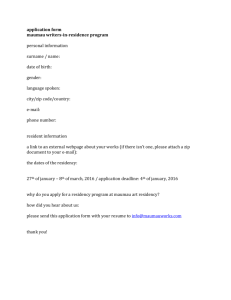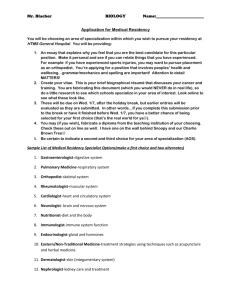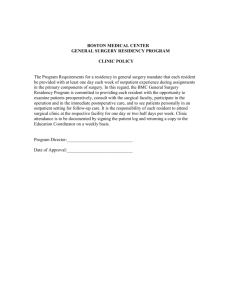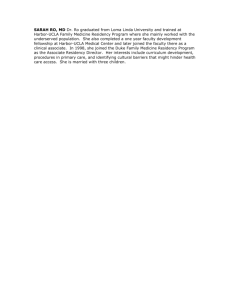Jung v. Association of American Medical Colleges: Victory
advertisement
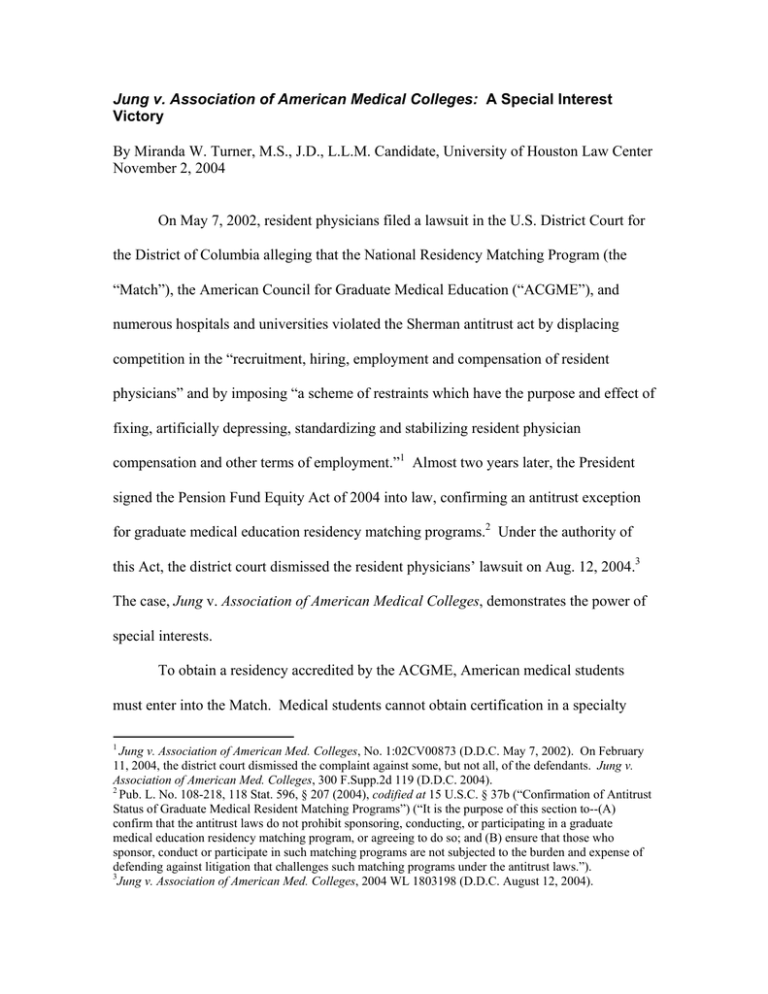
Jung v. Association of American Medical Colleges: A Special Interest Victory By Miranda W. Turner, M.S., J.D., L.L.M. Candidate, University of Houston Law Center November 2, 2004 On May 7, 2002, resident physicians filed a lawsuit in the U.S. District Court for the District of Columbia alleging that the National Residency Matching Program (the “Match”), the American Council for Graduate Medical Education (“ACGME”), and numerous hospitals and universities violated the Sherman antitrust act by displacing competition in the “recruitment, hiring, employment and compensation of resident physicians” and by imposing “a scheme of restraints which have the purpose and effect of fixing, artificially depressing, standardizing and stabilizing resident physician compensation and other terms of employment.”1 Almost two years later, the President signed the Pension Fund Equity Act of 2004 into law, confirming an antitrust exception for graduate medical education residency matching programs.2 Under the authority of this Act, the district court dismissed the resident physicians’ lawsuit on Aug. 12, 2004.3 The case, Jung v. Association of American Medical Colleges, demonstrates the power of special interests. To obtain a residency accredited by the ACGME, American medical students must enter into the Match. Medical students cannot obtain certification in a specialty 1 Jung v. Association of American Med. Colleges, No. 1:02CV00873 (D.D.C. May 7, 2002). On February 11, 2004, the district court dismissed the complaint against some, but not all, of the defendants. Jung v. Association of American Med. Colleges, 300 F.Supp.2d 119 (D.D.C. 2004). 2 Pub. L. No. 108-218, 118 Stat. 596, § 207 (2004), codified at 15 U.S.C. § 37b (“Confirmation of Antitrust Status of Graduate Medical Resident Matching Programs”) (“It is the purpose of this section to--(A) confirm that the antitrust laws do not prohibit sponsoring, conducting, or participating in a graduate medical education residency matching program, or agreeing to do so; and (B) ensure that those who sponsor, conduct or participate in such matching programs are not subjected to the burden and expense of defending against litigation that challenges such matching programs under the antitrust laws.”). 3 Jung v. Association of American Med. Colleges, 2004 WL 1803198 (D.D.C. August 12, 2004). area of medical practice without completing a ACGME certified residency program, and a residency program cannot be certified without agreeing to participate in the Match. In the Match, fourth year medical students submit a ranked list of desired medical resident positions and the residency programs submit ranked lists of the students they would be interested in hiring. A central computer then runs a complex algorithm that matches medical students to residency programs. Each successfully matched student receives the name of one residency program and is contractually bound to accept that placement. Those students who are not matched may compete for the remaining open residency positions.4 A group of current and former resident physicians became convinced that the Match imposed anticompetitive restraints on medical residency hiring by eliminating the negotiating ability of the prospective residents, which led to relatively fixed and depressed compensation packages for medical residents. When they filed suit against various institutions and organizations involved in the Match in 2002, Jung v. Association of American Medical Colleges was born. The plaintiffs initially alleged a three prong conspiracy in violation of Section I of the Sherman Act. The first prong involved the Match itself, alleging that the structure of the program was such that the vast majority of prospective residents were forced into entering the Match. The second prong involved AGCME accreditation standards, which the plaintiffs alleged further restricted residency employment because: 1) AGCME had the ability to regulate the number of employment positions in an accredited residency program; 2) AGCME imposed significant obstacles to the ability of a resident to transfer to another position during the residency period, thus making the initial assignment permanent; 3) AGCME required programs to participate in 4 See Jung, 300 F.Supp 2d at 126-127. the Match in order to obtain accreditation; and 4) AGCME directly reviewed resident compensation and other terms of employment with the purpose of fixing and depressing them. The third prong of the conspiracy involved the defendants’ exchange of information concerning resident compensation and other terms of employment through surveys and databases for the purpose of standardizing compensation and other terms of employment.5 The various defendants’ brought motions to dismiss alleging lack of personal jurisdiction, lack of subject matter jurisdiction, and failure to state a claim, but the district court overruled these motions (with the exception of a few defendants’ personal jurisdiction claims) and allowed the case to proceed in early 2004.6 Although the plaintiffs had their first victory, it was to be short lived. At least one unknown member of Congress, acting on behalf of the powerful special interests with a stake in keeping the current residency program structure in place, prevented the plaintiffs from further victory. In April 2004, a draft of the Pension Fund Equity Act, a law designed to update the interest rate for the purposes of calculating pension contributions, was nearly ready to be voted upon. Neither the House of Representatives nor the Senate had conducted any inquiry nor held any discussion concerning the Jung case or the current system of assigning medical school graduates to residency programs. Neither House had proposed any rider to the Pension Fund Equity Act prior to the Act going to Conference Committee. However, when the Congressional Conference Committee emerged with its final version of the Act, it inexplicably contained a rider directly addressing the very issues at the heart of Jung: 5 6 Id. Id. It shall not be unlawful under the antitrust laws to sponsor, conduct, or participate in a graduate medical education residency matching program, or to agree to sponsor, conduct, or participate in such a program. Evidence of any of the conduct described in the preceding sentence shall not be admissible in Federal court to support any claim or action alleging a violation of the antitrust laws.7 The rider also provided that the provision was to be applied retroactively.8 A few members of Congress commented upon the unorthodox addition of the rider to the Act. Prior to the Act’s passage, Senator Kohl criticized the antitrust exemption provision because it “was not reviewed or debated by either the Senate or House, much less voted upon” and because “[t]he exemption will end many of the claims in an ongoing lawsuit that has already survived efforts to have it dismissed.”9 Senator Feingold also mentioned he was “troubled” by the “11th hour addition” of the antitrust exemption to the conference report without any hearings in the Senate Judiciary Committee or the Senate as a whole, going on to state that for “the managers of this bill to insert a controversial provision with no Senate debate or discussion is the worst way to legislate.”10 However, Congress was under tremendous pressure to pass the Act prior to the start of the new tax season, which left little time to dispute the added provision without jeopardizing the timely passage of the Act. On April 8 and April 10, 2004, Congress passed and the President signed the Act into law. Shortly thereafter, Senator Bingaman expressed his misgivings: This provision grants a retroactive antitrust exemption to the graduate medical education matching program, a subject that is entirely unrelated to the bill and never received a full consideration by normal processes of this 7 Pub. L. No. 108-218, 118 Stat. 596 (2004), codified at 15 U.S.C. § 37b ("Confirmation of Antitrust Status of Graduate Medical Resident Matching Programs"). 8 Id. § 37b(c) (“This section shall take effect on April 10, 2004, shall apply to conduct whether it occurs prior to, on, or after April 10, 2004 . . .”). 9 Congressional Record page S3979, April 8, 2004 (emphasis added). 10 Id. body. . . . I do not think that exemptions from this nation’s antitrust laws should be lightly given. Second, I think the process by which this exemption was given– without any opportunity for hearing before the appropriate committees or full and real consideration by this body–was improper.11 Nevertheless, the President’s signing of the Bill into law effectively ended the Jung suit, which was ultimately decided on the pleadings with respect to some defendants, and dismissed with regard to the others, on August 12, 2004.12 The plaintiffs did make a final attempt to challenge the law or, in the alternative, maintain their suit without the Match allegations; however, both efforts were ultimately unsuccessful.13 11 Congressional Record- Senate- May 11, 2004. Jung, 2004 WL 1803198. 13 Id. 12

